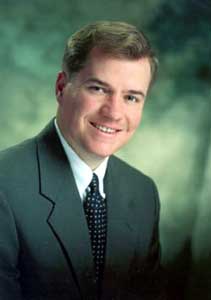-
- Schools examine lessons of Massachusetts same-sex marriages
- New Virginia law causes some gays to consider leaving state
- Newly married lesbian couple files lawsuit over cancer
- Timing of same-sex marriage vote may hinge on definitions
- Parents turn to courts to stop bullying
- Governor tries to find his way through politically treacherous ground
- National News Briefs
- World News Briefs
national
Timing of same-sex marriage vote may hinge on definitions
Question of original bill or copy will decide when bill is heard
Published Thursday, 27-May-2004 in issue 857
JEFFERSON CITY, Mo. (AP) – Before Missouri voters get to decide whether the definition of marriage includes same-sex couples, Missouri’s court system may first have to decide the definition of the word “the.”
If that sounds a little bit like President Clinton’s famous question about the definition of “is,” perhaps it is fittingly so. Just as there was a touch of politics surrounding the inquiry into Clinton’s sexual activities, so also there is a pinch of politics involved with the same-sex marriage ban.
Missouri’s Republican-led Legislature, in the closing minutes of this year’s session, passed a proposed constitutional amendment banning same-sex marriage (although the state already has a law doing the same). The constitutional amendment would automatically go before statewide voters in November, unless the governor sets a special election sooner – which is exactly what Democratic Gov. Bob Holden has attempted to do.
The background for the ensuing legal battle is this:
- Republicans want the marriage amendment on the November general election ballot, where it could draw conservative voters to the polls who presumably would also vote for GOP candidates.
- For that same reason, Democrats want the same-sex marriage amendment on the August party primary ballot, where Democrats and Republicans are not pitted against one another.
When Republican Secretary of State Matt Blunt refused to follow Holden’s August election proclamation, Democratic Attorney General Jay Nixon sued to force him to do so.
Blunt won round one before Cole County Circuit Judge Richard Callahan.
Round two occurred May 17 before the Western District state Court of Appeals.
The third and deciding round ultimately will be in the Missouri Supreme Court.
At issue is whether a proposed constitutional amendment is subject to the same requirements imposed on bills passed by the Legislature.
The state constitution requires bills to be signed by the presiding officers of the House and Senate before they are sent to the governor to become law. Proposed constitutional amendments bypass the governor and go straight to the secretary of state.
Because of the difference, Nixon claims the bill signing requirements don’t apply and asserts that Holden can call a special election as soon as the Legislature’s votes approving the measure have been entered in the House and Senate journals.
Blunt contends the legislative signature requirement does apply. Blunt also points to Missouri law 116.160, which directs the secretary of state’s office to begin the process of placing a proposal on the ballot “after receipt of the resolution or bill.”
In this case, Republican legislative leaders signed and sent Blunt the same-sex marriage amendment three days after the deadline for the secretary of state to notify local election authorities of items to appear on the August ballot.
That could effectively force the measure to the November ballot, depriving Holden of his ability to call an August election.
If Blunt must actually receive a proposed amendment before starting the ballot process, then Nixon contends that requirement already has been fulfilled.
Blunt received the text of Senate Joint Resolution 29 (the proposed same-sex marriage amendment) as part of Holden’s election proclamation. And Blunt’s office was served with a copy of the resolution when Nixon sued the secretary of state.
But Blunt counters that copies don’t count. He says the only version that matters is THE resolution – the one signed by the Legislature’s presiding officers as a verification that it passed.
“It doesn’t say a copy of the bill, it says the bill,” Blunt’s general counsel, Terry Jarrett, argued in circuit court.
Nixon’s office doesn’t believe in such a narrow definition.
“There is no requirement ... that the secretary of state receive from the General Assembly a signed copy of the bill,” Nixon’s deputy chief of staff, Paul Wilson, argued in court. “That is the excuse he has proffered” for not setting the August election.
Callahan apparently believed Blunt’s definition over Nixon’s.
But THE end of the matter is yet to come.
|
|
Copyright © 2003-2025 Uptown Publications


